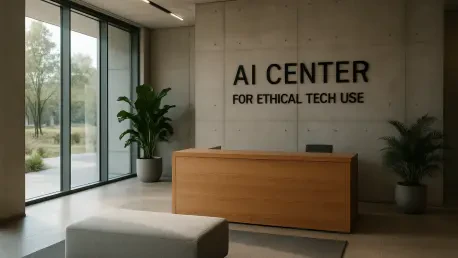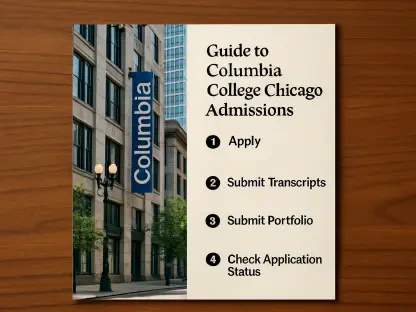In an era where artificial intelligence (AI) is reshaping every facet of society, from education to the workplace, Benedictine College in Atchison, Kansas, is taking a bold step to address its implications with a values-driven approach. This liberal arts institution, rooted in Catholic tradition, has unveiled the Center for Technology and Human Dignity, a groundbreaking initiative designed to explore the ethical, theological, and practical challenges posed by AI. Under the patronage of St. Carlo Acutis, a recently canonized saint known for his mindful engagement with technology, the college aims to guide its community through the complexities of AI while staying true to its mission of human flourishing. The rise of AI brings with it urgent questions about how technology might redefine human identity, labor, and creativity, and Benedictine is positioning itself as a leader in navigating these uncharted waters with a balance of innovation and caution.
The urgency to address AI’s impact is palpable on campus, where both faculty and students recognize the dual nature of this powerful tool. While AI offers undeniable benefits for learning and efficiency, there is growing concern that it could erode essential human qualities like originality and personal connection to work. Through the new center, the college seeks to foster a dialogue that not only prepares students for a tech-driven future but also safeguards their moral and spiritual grounding. This initiative reflects a broader trend in higher education to confront AI’s societal influence head-on, ensuring that technological advancements serve humanity rather than diminish it.
Ethical Dimensions of Emerging Technology
AI’s Challenge to Human Dignity
At the core of Benedictine College’s mission with the new center lies a deep concern for how AI intersects with human dignity. The very concept of artificial intelligence raises profound questions about what constitutes intelligence and personhood, challenging traditional understandings rooted in theological and philosophical thought. Led by theology professor and bioethicist Mariele Courtois, the initiative seeks to critically examine whether AI enhances or impedes the innate value of human life. There is a particular focus on ensuring that technology remains a servant to human needs rather than a force that redefines or devalues personal identity. By fostering reflection on these issues, the college aims to develop frameworks that prioritize ethical considerations over mere technological convenience, setting a precedent for how educational institutions can approach such dilemmas.
Beyond the philosophical, the ethical discourse at Benedictine also tackles the societal implications of AI’s rapid integration. There is an acknowledgment that unchecked adoption of these technologies could lead to unintended consequences, such as reinforcing biases or diminishing the human experience to mere data points. The center plans to serve as a hub for interdisciplinary dialogue, bringing together scholars, technologists, and ethicists to explore how AI can be shaped to align with values of compassion and respect. This proactive stance underscores the college’s commitment to not just react to technological shifts but to actively influence their trajectory in a way that upholds the sanctity of human life and purpose.
AI’s Influence on Work and Personal Bonds
Another pressing concern at Benedictine revolves around AI’s potential to transform the nature of work and interpersonal relationships. Many within the college community fear that automation and AI-driven processes might create a disconnect between individuals and the meaningful labor that often defines personal fulfillment. If machines increasingly take over tasks once performed by humans, there is a risk that people could lose a sense of purpose tied to their contributions. The center aims to delve into these dynamics, exploring ways to ensure that technology supports human effort rather than replaces it entirely, preserving the dignity inherent in work as a form of vocation and service.
Additionally, the impact of AI on relationships is a topic of significant discussion. As digital interactions and AI tools become more prevalent, there is a concern that authentic human connection could be undermined by superficial or algorithm-driven exchanges. Benedictine’s initiative seeks to address this by promoting technologies that enhance rather than detract from genuine engagement. By examining case studies and real-world applications, the center hopes to offer insights into designing AI systems that foster community and empathy, rather than isolation. This focus reflects a broader commitment to ensuring that technological progress does not come at the expense of the relational bonds that define human existence.
AI’s Role in Academic Settings
Harnessing AI Without Sacrificing Creativity
Within the academic environment at Benedictine College, AI is viewed as both a promising tool and a potential hindrance to the learning process. On one hand, AI applications can streamline research, assist with problem-solving, and provide personalized learning experiences that enhance student outcomes. However, there is a significant worry among faculty and students alike that over-reliance on such tools could stifle the creative and critical thinking skills that are central to a liberal arts education. The Center for Technology and Human Dignity is tasked with finding a balance, developing guidelines that encourage the use of AI as a supportive resource while preserving the originality and personal engagement that define academic growth. This delicate equilibrium is essential for preparing students for a future where technology is ubiquitous yet not all-encompassing.
Furthermore, the college is keen on integrating ethical training into the use of AI in education. Faculty are exploring ways to teach students how to critically assess AI-generated content, ensuring they understand its limitations and biases. This educational approach aims to prevent the passive acceptance of technology as infallible, instead fostering a mindset of discernment. By embedding these principles into curricula and classroom discussions, Benedictine hopes to cultivate a generation of learners who can harness AI’s benefits without losing the intellectual curiosity and innovative spirit that drive true scholarship. The center will play a pivotal role in shaping these educational strategies for long-term impact.
Student Concerns and Real-World Implications
Students at Benedictine, such as junior Timothy Kasprzak, have voiced distinct concerns about how AI influences their academic journey. Many feel that while AI tools can simplify tasks like drafting essays or solving complex problems, they often produce generic or conventional solutions that dampen individual expression. This reliance risks diminishing the passion for learning that comes from wrestling with challenges independently. Kasprzak’s perspective highlights a broader unease among peers that AI could reduce education to a series of automated outputs rather than a deeply personal pursuit of knowledge. The center aims to address these issues by creating spaces for students to share their experiences and collaborate on solutions that preserve the integrity of their academic work.
Moreover, the student perspective sheds light on the practical challenges of navigating AI in everyday academic life. There is a call for clear policies on the acceptable use of AI tools to prevent misuse or overdependence, which could undermine learning objectives. The center plans to work closely with student groups to develop resources and workshops that tackle these real-world implications head-on. By prioritizing student input, Benedictine ensures that its approach to AI remains grounded in the lived experiences of those most directly affected. This collaborative effort is poised to set a model for how educational institutions can respond to technological shifts with empathy and practicality.
Faith-Based Perspectives on Technology
Integrating Theological Insights with Innovation
Benedictine College’s response to AI is deeply informed by its Catholic identity, drawing on theological insights and papal guidance to shape its initiatives. Notably, directives from Pope Leo XIII emphasize the importance of engaging with AI thoughtfully, ensuring that technological advancements align with the principles of human dignity and moral responsibility. This framework guides the college in crafting policies and discussions that prioritize ethical considerations over purely utilitarian benefits. The Center for Technology and Human Dignity serves as a platform for integrating these faith-based perspectives, encouraging faculty and students to reflect on how AI can be used in ways that honor the spiritual dimensions of human life rather than detract from them.
Additionally, the theological approach at Benedictine extends beyond abstract reflection to practical application in educational and societal contexts. The college seeks to explore how Catholic teachings on vocation and community can inform the development and use of AI, ensuring that technology serves as a tool for justice and compassion. By hosting seminars and interdisciplinary panels, the center aims to bridge the gap between faith and innovation, offering insights that are both spiritually grounded and relevant to contemporary challenges. This integration of theology with technology underscores the college’s mission to address modern issues through a lens of enduring values.
Symbolism and Inspiration from St. Carlo Acutis
The dedication of the center to St. Carlo Acutis carries profound symbolic weight, reflecting Benedictine’s aspiration to approach technology with both enthusiasm and discernment. Known for his thoughtful use of digital tools to spread faith, St. Carlo Acutis serves as an inspiring figure for balancing innovation with spiritual integrity. His legacy encourages the college community to embrace AI as a means of enhancing human potential while remaining vigilant about its ethical pitfalls. This patronage symbolizes a commitment to using technology in service of higher ideals, ensuring that advancements do not overshadow the fundamental values that define human existence.
Furthermore, the influence of St. Carlo Acutis extends to the cultural and educational ethos of the center’s programs. Initiatives under his patronage are designed to inspire students and faculty to view AI not with fear, but with a sense of purpose and responsibility. By invoking his example, Benedictine aims to cultivate a mindset that sees technology as a gift to be used wisely, fostering projects and discussions that reflect this balance. The center’s dedication to his memory reinforces the idea that ethical engagement with AI is not just a necessity but a calling, aligning technological progress with a deeper mission of human betterment.
Building a Community Response to AI Challenges
Laying the Foundation for Ethical Discourse
The establishment of the Center for Technology and Human Dignity marks a significant milestone in Benedictine College’s efforts to address AI from a distinctly Catholic perspective. This proactive step positions the institution as a leader in ethical tech discourse, demonstrating a commitment to shaping how AI is perceived and integrated within academic and societal spheres. Spearheaded by President Stephen D. Minnis, the center is seen as a pioneering response to papal calls for Catholic engagement with technology. Its creation reflects a strategic vision to not only react to AI’s challenges but to influence its development in ways that prioritize human flourishing over mere efficiency or profit. This foundation sets the stage for impactful contributions to broader conversations about technology’s role in education.
Equally important is the center’s role in fostering a campus-wide ethos of responsibility toward AI. By serving as a central hub for research and reflection, it encourages collaboration across departments, ensuring that diverse perspectives inform the college’s approach. The initiative also aims to produce actionable outcomes, such as policy recommendations and ethical guidelines, that can be shared with other institutions facing similar dilemmas. This outward-looking focus highlights Benedictine’s ambition to extend its influence beyond its own community, contributing to a global dialogue on the intersection of technology and morality. Such efforts underscore the transformative potential of the center’s work in redefining how AI is approached.
Encouraging Dialogue and Resource Development
A key component of the center’s mission is to facilitate open dialogue about AI’s complexities through talks, panel discussions, and community forums. These events are designed to bring together students, faculty, and external experts to share insights and debate the ethical implications of technology in various contexts. By creating spaces for such conversations, Benedictine ensures that its community remains informed and engaged with the rapid pace of technological change. The emphasis on dialogue also helps to demystify AI, breaking down technical jargon into accessible discussions that empower participants to grapple with its real-world effects. This collaborative environment is essential for building a shared understanding of how to navigate the challenges and opportunities AI presents.
In parallel, the center is committed to developing and publishing resources that provide practical guidance on ethical AI use. These materials, ranging from white papers to teaching aids, aim to equip educators and students with the tools needed to critically assess technology’s role in their lives. The focus on resource creation reflects a long-term vision of supporting not just the Benedictine community but also other educational institutions seeking to address similar issues. By documenting best practices and case studies, the center hopes to inspire a ripple effect, encouraging broader adoption of ethical frameworks for AI. This dual approach of dialogue and resource development positions the college as a beacon of thoughtful engagement in an increasingly tech-driven world.
Reflecting on a Path Forward
Looking back, Benedictine College took decisive steps to confront the ethical challenges of artificial intelligence by establishing the Center for Technology and Human Dignity. This initiative brought together diverse voices from across the campus, weaving together student concerns, faculty expertise, and administrative vision under a Catholic framework. Guided by the patronage of St. Carlo Acutis and inspired by papal teachings, the college crafted a response that balanced innovation with moral discernment. The dialogues initiated and the resources developed during this period laid a critical foundation for addressing AI’s impact on education and human dignity.
Moving forward, the focus should shift to scaling these efforts through partnerships with other institutions and tech organizations to refine and share ethical guidelines. Expanding the center’s reach by offering online courses or public webinars could democratize access to its insights, fostering a wider impact. Additionally, continuous evaluation of AI’s evolving role will be crucial to adapt strategies that remain relevant and effective. By sustaining this momentum, Benedictine can help shape a future where technology uplifts humanity, ensuring that ethical considerations remain at the forefront of progress.









